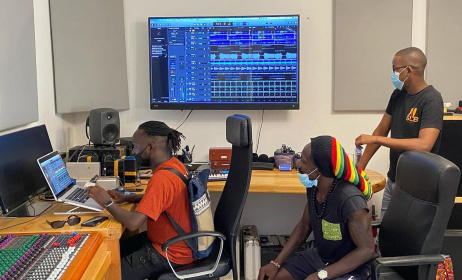Musicians question role of Kenyan CMOs
The transparency of collective management organisations (CMOs) in Kenya has once again come into sharp focus after a group of artists were taken aback by the amount of annual royalties payed out to them this week.
 Frasha.
Frasha.
Musicians represented by the Performers Rights Society of Kenya (PRISK) took to social media to voice their frustrations on what they see as unending exploitation by the CMO after receiving Ksh1 215 (about $20) each as a royalty payout since the beginning of 2022.
Some of the artists who decried the meagre amount include Wangechi, Nikita Kering and KRG The Don. “Annual reminder that being an artist in Kenya is still an extreme sport,” Wangechi wrote on social media.
P-Unit member Gabu also shared a screenshot of the amount he received from PRISK. “Surely what is this now? Are they even serious? Hii ni madharau sana (this is highly demeaning). We want change, not pocket change,” Gabu said.
His bandmate Frasha, an outspoken critic of PRISK, said this was unsurprising and that the entire collective management system in Kenya needed urgent repair. Speaking to Music In Africa, the rapper painted a dysfunctional picture and placed the blame squarely on the regulator, the Kenya Copyright Board (KECOBO).
“There are loopholes in the law that allow CMOs to get away with so much and KECOBO has no way of dealing with them,” Frasha said. “Every time KECOBO flexes its muscles and, say, takes away their operating licenses, a series of court cases ensue and at the end of the day it is the artists who suffer.
“There is also the possibility that they don’t collect enough but there is truly no way of knowing how much they get. The biggest issue, however, is the matter of poor management of funds.''
The artist says they have taken their pleas to Parliament where there is currently a petition to improve the Copyright Act. He added that there are broadcast companies who are not remitting royalties because of under-the-table deals they have entered into with the CMOs.
Frasha nevertheless remains optimistic of a better future, giving the example of Zimbabwe where he says CMOs are transparent and broadcasters duly pay what is owed in royalties.
Kenyan musicians have been complaining about the mismanagement of CMOs for decades. In 2020, KECOBO released the findings of a forensic audit covering the 2017-19 period, in which it exposed systemic inefficiencies at Kenya‘s three licensed CMOs – PRISK, the Music Copyright Society of Kenya (MCSK) and the Kenya Association of Music Producers (KAMP) – including negligence, diversion of royalties, fraudulent transactions, ghost and duplicate members, non-compliance, poor corporate governance, and policy breaches, among others.
“In Kenya, it is the guy in a suit who earns more than the artist,” Frasha said.



























Commentaires
s'identifier or register to post comments